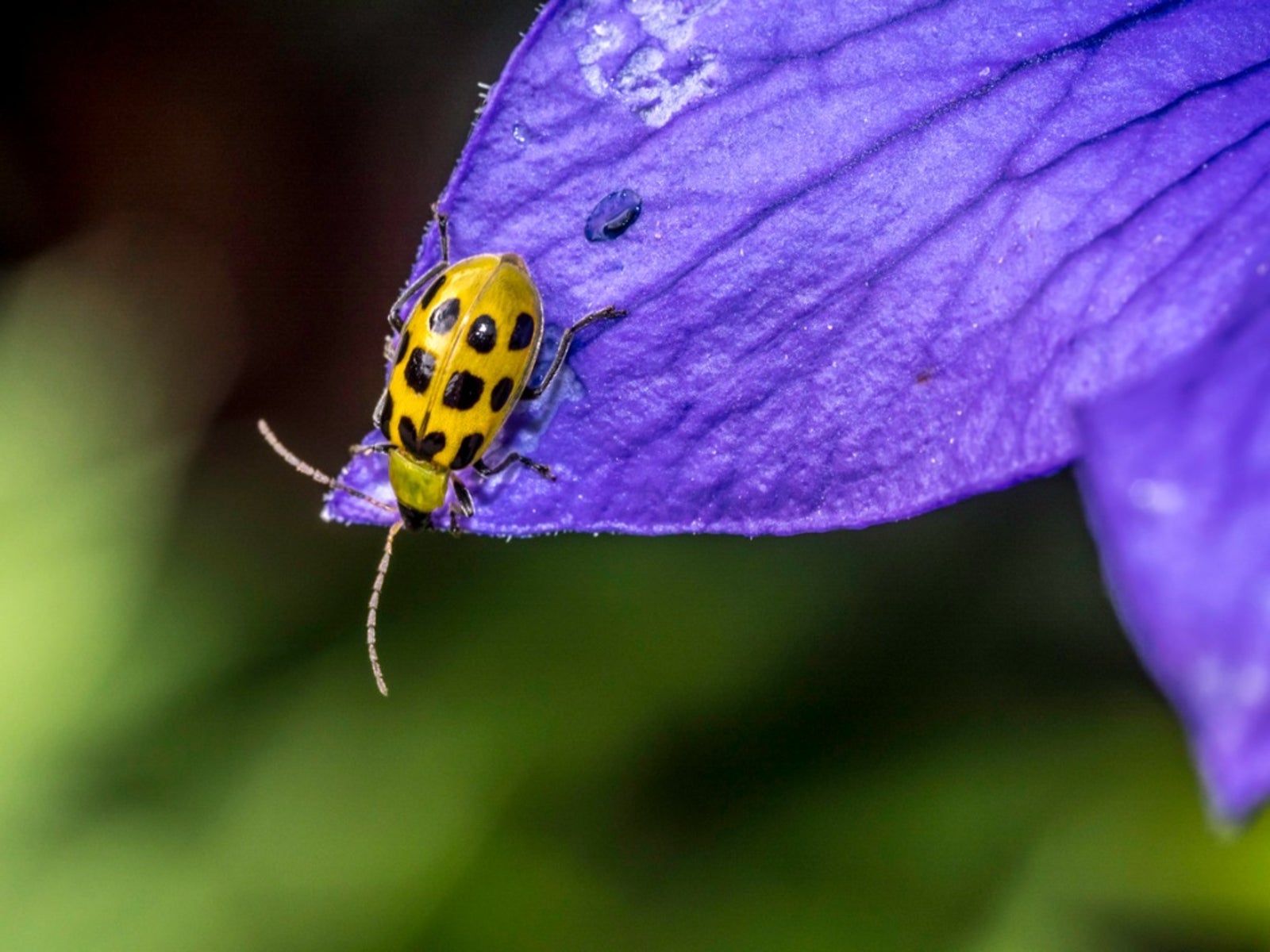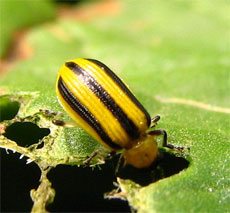Controlling Cucumber Beetles - How To Deter Cucumber Beetles In The Garden


Controlling cucumber beetles is important for your garden if you grow cucumbers, melons, or squash. Damage from cucumber beetles can devastate these plants, but with a little cucumber beetle control, you can keep this harmful pests from destroying your cucumber and cucurbit crops.
Cucumber Beetle Identification
Cucumber beetles actually come in two varieties. While the two varieties look different, their damage is the same. The striped cucumber beetle is either yellowish-green or orangeish-green with three black stripes down its back. The spotted cucumber beetle is also either yellowish-green or orangeish-green with 12 black spots on its back. Both pests are about 1/4 inch (0.5 cm.) long.
Cucumber Beetle Damage

Image by carol2chat
Cucumber beetles will eat the leaves, flowers, and fruit of bean, cucumber, melon, asparagus, corn, eggplant, and squash plants and their larva will chew on the roots of these plants. While there is some damage from this to the plants, the real reason that cucumber beetle control is important to a garden is because cucumber beetles are carriers of cucumber bacterial wilt and cucumber mosaic, which affects squash, melons, and cucumbers. They affect cucumbers the most. Cucumber bacterial wilt and cucumber mosaic can survive in the digestive system of a cucumber beetle and as a cucumber beetle moves from plant to plant to feed, it spreads these diseases to all the plants it eats. Once a plant is infected with either bacterial wilt or cucumber mosaic, it cannot be cured and will either die or become unproductive after they are infected.
How to Deter Cucumber Beetles
Controlling cucumber beetles starts with keeping them away from your plants in the first place. The best way how to deter cucumber beetles is with row covers or some other covering on the plant. Cucumber beetles will emerge in mid spring, so row covers should be in place as soon as the plants are put in the ground to protect them from the cucumber beetles. The row covers can be removed when the plants bloom in order to allow pollinators access to the plants.
How to Kill Cucumber Beetles
Since cucumber beetles overwinter in wood and are difficult to eliminate through simple garden cleanliness, simply deterring cucumber beetles may not be an option if your garden is already infested with these pests. One method of cucumber beetle control is to use insect predators. Natural predators to cucumber beetles include:
Insecticides can also be used for controlling cucumber beetles as well, but keep in mind when you use insecticide, you may kill the natural predators and beneficial bugs that are already in your garden. Using insecticide to kill cucumber beetles is a multi-step process to ensure that both the adult and larvae of cucumber beetles are killed. In all steps, the best time to treat your plants with insecticide is in the early evening as this is when the cucumber beetles will be most active. Cucumber beetle control with insecticide starts in mid spring when the cucumber beetles emerge from their overwintering locations. Spray the plants weekly for two to three weeks. Treat the plants again in early summer so that you can kill some of the cucumber beetle larvae that will be emerging from the eggs at this time. Treat your plants again with insecticide in the late summer to kill any adults that have recently developed from the larvae.
Gardening tips, videos, info and more delivered right to your inbox!
Sign up for the Gardening Know How newsletter today and receive a free copy of our e-book "How to Grow Delicious Tomatoes".

Heather Rhoades founded Gardening Know How in 2007. She holds degrees from Cleveland State University and Northern Kentucky University. She is an avid gardener with a passion for community, and is a recipient of the Master Gardeners of Ohio Lifetime Achievement Award.
-
 8 Noteworthy Native Azaleas Every Gardener Should Know – And Grow!
8 Noteworthy Native Azaleas Every Gardener Should Know – And Grow!Native azaleas offer brilliant blooms in a range of colors and sizes. Here are a few favorites to get inspired and start working on a native shade garden!
-
 Growing Climbing Roses: How To Create Elegant Displays With Maximum Blooms
Growing Climbing Roses: How To Create Elegant Displays With Maximum BloomsMaster the art of growing stunning climbing roses with this essential guide to creating vibrant, fragrant walls and structures all summer long.